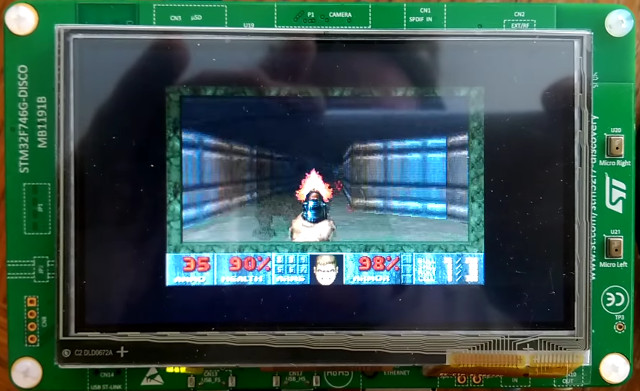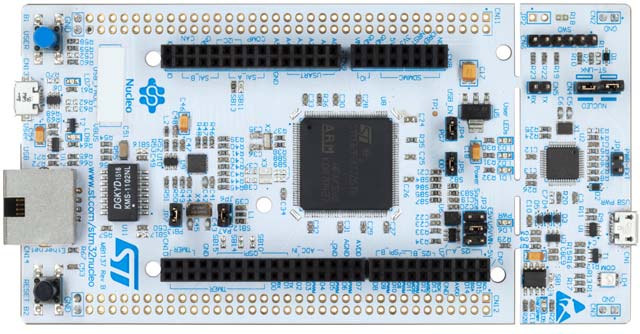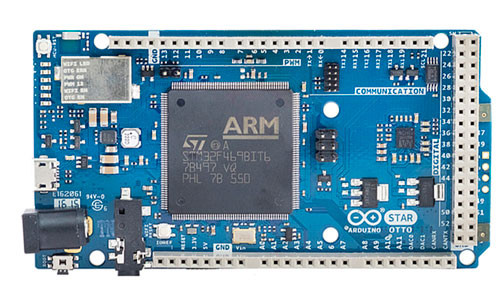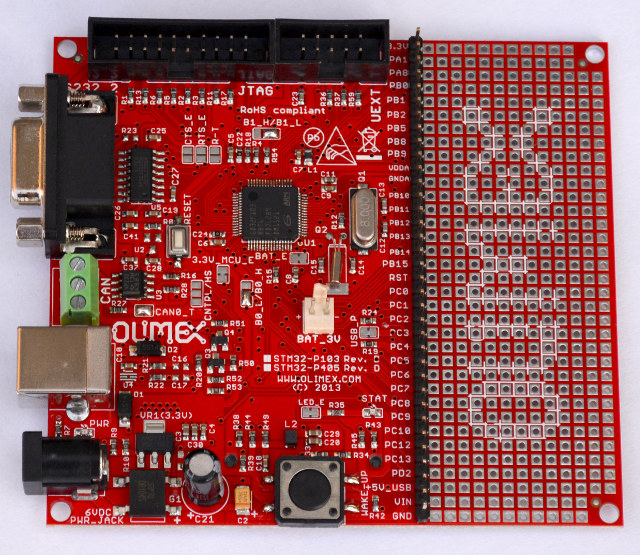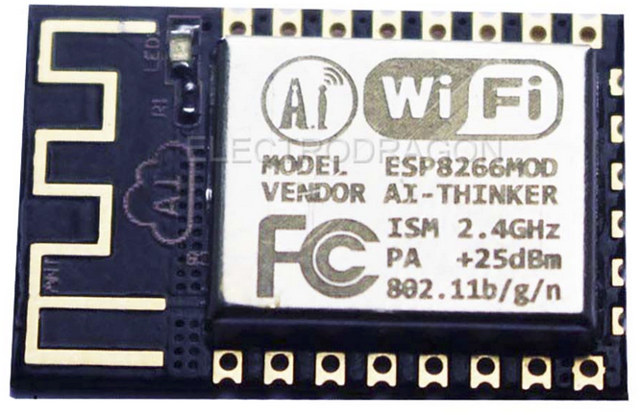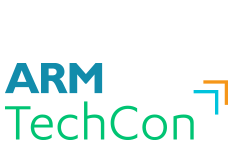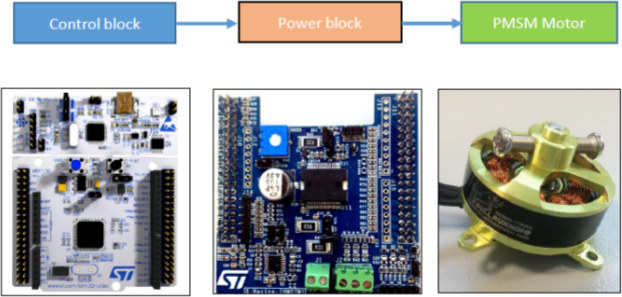Frosted, which stands for “Free Operating Systems for Tiny Embedded Devices”, is an OS with a POSIX-compliant system call API, borrowing the Linux kernel kconfig for configuration, and currently supporting ARM Cortex M0,M3,M4, and M7 MCU including Texas Instruments Stellaris LM3S, STMicro STM32F4/F7, and NXP LPC17XX micro-controllers. The developers are focusing on IoT applications, as well as porting retro-games such as Doom. The kernel relies on libopencm3 for hardware abstraction, and the operating system can be built with GCC ARM for Frosted using the source code released under a GNU GPLv2 license. The Wiki explains how to build and run the OS on either Qemu (in a Linux computer) used LM3S target, or an STM32F4 Cortex -M4 or STM32F7 Cortex-M7 board. The team also uploaded showing a video of Doom (fdoom) running on STM32F7 board, and possibly adapted from stm32doom port. If you are interested in joining the project you can […]
STMicro Unveils Two Low Cost STM32F7 ARM Cortex M7 Development Boards
STMicroelectronics introduiced its STM32F7 ARM Cortex M7 micro-controller family in 2014, and they released a $49 STM32F746G discovery board later in 2015. The company has now launched two new low cost development boards with the $23 STM32 Nucleo-144 board based on STM32F767 MCU, and a $79 Discovery Kit powered by STM32F746 MCU with TFT-LCD and MIPI-DSI support. STM32 Nucleo-144 development board Key feature of NUCLEO-F767ZI board: MCU – STMicro STM32F767ZI ARM Cortex M7 microcontroller @ 216 MHz with FPU, DSP, MMU, 2MB flash, 512 KB SRAM, 16 KB instruction TCM RAM (for critical real-time routines), and 4 KB backup SRAM Connectivity – IEEE-802.3-2002 compliant Ethernet connector USB – 1x micro USB OTG or full speed device Extension: ST Zio connector including support for Arduino UNO v3 connectivity, and additional signals (A6 to A8, D16 to D72) ST morpho extension pin header footprints for full access to all STM32 I/Os On-board […]
$49 STEVAL-WESU1 Wearable Sensor Unit Reference Design is Based on STMicro STM32 MCU
STMicroelectronics STEVEL-WESU1 is a wearable open source hardware reference design and development kit comprised of a board with STM32L1 ARM Cortex-M3 micro-controller, BlueNRG-MS Bluetooth LE chip, and sensors, a battery, and a watch band. STMicro “WESU” specifications and features: MCU – STMicro STM32L151VEY6 32-bit ARM Cortex-M3 MCU @ 32 KHz to 32 MHz, 512KB flash, 80 KB SRAM Connectivity – Bluetooth 4.0 LE via BlueNRG-MS BLE network processor Sensors – 3D accelerometer + 3D gyroscope (LSM6DS3), 3-axis magnetometer (LIS3MDL), MEMS pressure sensor (LPS25HB) USB – 1x micro USB port for recharging Debugging – SWD connector for debugging and programming capability Power 100 mAh Li-Ion battery included, UN38.3 tested and certified STNS01 Li-Ion linear battery charger STC3115 Fuel gauge IC Watch strap with plastic housing included Certifications – FCC (FCC ID: S9N-WESU1), IC (IC: 8976C-WESU1), RoHS The kit can be controlled by ST WeSU app for Android and iOS, and developed using BlueST […]
STAR OTTO Arduino Board is Based on STMicro STM32 32-bit Cortex-M4 MCU & ESP8266 WiFi SoC
Thanks to STMDuino32 community, there was already support for the Arduino IDE on board based on STMicro STM32 ARM Cortex-M micro-controllers, but STMicroelectronics and Arduino Srl have introduced the STAR program to bring official support, and unveiled their first board with STAR OTTO Arduino board powered by STM32F469 Cortex M4 MCU at Maker Faire Bay Area 2016. Key features of STAR OTTO board (ARD-OTTO-STM32): MCU – STMicro STM32F469BIT6 ARM Cortex-M4 MCU @ 180 MHz with 2 MB Flash memory, 384 KB SRAM, Chrom-ART graphics accelerator System Memory – 16 MB SDRAM Storage – 128 KB EEPROM, microSD slot Connectivity – Wi-Fi 802.11b/g/n @ 2.4 GHz via Espressif ESP8266 Display I/F – MIPI DSI display interface Camera – Camera connector Audio – 2x MEMS digital microphones, headphone and speaker output USB – 1x micro USB host interface Expansion – Arduino Uno, Due, Mega connectors including 8x ADC, 2x DAC, 32 digital […]
GigaDevice GD32 is a Faster, Software and Pin-to-pin STM32 Compatible Cortex M3 MCU
Las month, Olimex discovered a Chinese company called GigaDevice has made an STM32 clone called GD32 and compatible with STM32F103, but with higher core frequency (108MHz). Olimex has now posted an update after receiving a letter from GigaDevice, and trying GD32F103RBT6 MCU on their own STM32F103 boards. The company explained that GD32 was their own implementation, and claimed rights on GD32 trademarks, while Olimex discovered than GD32 was working just fine on their board having passed “all functional tests without any modifications”, and with all the same development tools and software code running fine. GD32F103xx datasheet (PDF / English version) can be downloaded to find a few more details: The GD32F103xx device incorporates the ARM Cortex-M3 32-bit processor core operating at 108 MHz frequency with Flash accesses zero wait states to obtain maximum efficiency. It provides up to 3 MB on-chip Flash memory and up to 96 KB SRAM memory. […]
ESP-14 WiFi Module Combines ESP8266 with STM8S MCU
ESP8266 WiFi modules can be purchased for less than $3, while some STM8S 8-bit MCUs board sell for just above $1. A.I. Thinker decided to combine both by adding an STMicro STM8S003 micro-controller to ESP-12E module and called that ESP-14. ESP-14 specifications: WiSoC – Expressif ESP8266-EX WiSoC MCU – STMicro STM8S003F3P6 8-bit MCU @ 16 MHz with 1KB RAM, 8KB flash, and 128 bytes EEPROM Connectivity – 802.11 b/g/n WiFi I/Os – STM8: 15 GPIOs also supporting I2C, SPI, UART, and up to 5 10-bit ADC ESP8266: E_GPIO0 to select operating mode (running or download) Power Supply – 3.3V Power Consumption – System Standby mode 70 mA; 0.5 μA shutdown @3.3V Dimensions – 24 x 16 mm STM8S controls ESP8266 by AT commands, and all but one of the I/Os are directly connected to STM8S. I can see at least two advantages: 5 ADC inputs are available, and for battery […]
ARM TechCon 2015 Schedule – IoT, Servers, 64-bit ARM, Power Usage Optimization, and More
The ARM Technology Conference (ARM TechCon) will take place on November 10 – 12, 2015, in Santa Clara Convention Center, and just like every year, there will be a free exposition for companies to showcase their latest innovation and/or products, as well as a technical conference with sessions and workshops sorted into various tracks: Automotive/Embedded Vision Embedded IoT Mobile/Connectivity Networking Infrastructure/Servers Tools & Implementation Wearables/Sensors ARM Training Day Sponsored Vendor Training Special Event General Event Software Developers Workshop You can find the complete schedule on ARM TechCon website. Although I won’t attend, I’ve created my own virtual schedule with some of the sessions I found interesting. Tuesday – November 10 8:30 – 9:20 – ARM Vision for Thermal Management and Energy Aware Scheduling on Linux by Ian Rickards (ARM), Charles Garcia-Tobin (ARM), Bobby Batacharia (ARM) This talk will cover the history and where are we going, for ARM’s Power Software (IPA, […]
STMicro Introduces $35 STM32 Motor Control Nucleo Pack
STMicroelectronics has recently launched P-NUCLEO-IHM001 motor control starter kit with NUCLEO-F302R8 Cortex M4 MCU board, X-NUCLEO-IHM07M1 driver board for BLDC (Brushless DC) and PMSM (Permanent Magnet Synchronous Motor) electric motors, as well as a Bull Running motor often used in RC helicopters and quadcopters. Technical specifications of the three hardware “blocks” of the kit: X-NUCLEO-IHM07M1 driver board: Three-phase driver board for BLDC/PMSM motors based on L6230 Nominal voltage range from 8 V to 48 V DC 2.8 A output peak current (1.4 A RMS) Non dissipative overcurrent detection and protection Compatible with ST 6-step or ST FOC control algorithm Support for sensorless and sensor mode Hall / encoder motor sensor connector and circuit Configurable jumpers for motor current sensing Potentiometer available for speed regulation ST morpho connectors (found in Nucleo boards) NUCLEO-F302R8 MCU board: STMicro STM32F302R8 Cortex-M4 @ up to 72 MHz with 64KB Flash memory and 16KB SRAM Expansion […]


